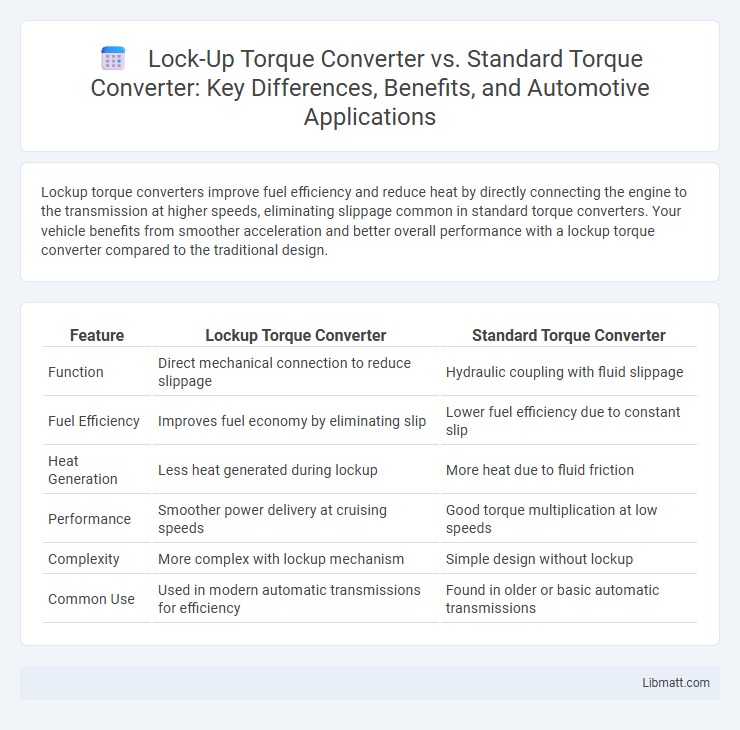Lockup torque converters improve fuel efficiency and reduce heat by directly connecting the engine to the transmission at higher speeds, eliminating slippage common in standard torque converters. Your vehicle benefits from smoother acceleration and better overall performance with a lockup torque converter compared to the traditional design.
Table of Comparison
| Feature | Lockup Torque Converter | Standard Torque Converter |
|---|---|---|
| Function | Direct mechanical connection to reduce slippage | Hydraulic coupling with fluid slippage |
| Fuel Efficiency | Improves fuel economy by eliminating slip | Lower fuel efficiency due to constant slip |
| Heat Generation | Less heat generated during lockup | More heat due to fluid friction |
| Performance | Smoother power delivery at cruising speeds | Good torque multiplication at low speeds |
| Complexity | More complex with lockup mechanism | Simple design without lockup |
| Common Use | Used in modern automatic transmissions for efficiency | Found in older or basic automatic transmissions |
Introduction to Torque Converters
Torque converters transfer engine power to the transmission by using fluid dynamics, enabling smooth acceleration without a direct mechanical connection. Lockup torque converters improve efficiency by mechanically linking the engine and transmission at cruising speeds, reducing slippage and fuel consumption. Your vehicle benefits from enhanced fuel economy and performance when equipped with a lockup torque converter compared to a standard model.
What is a Standard Torque Converter?
A standard torque converter is a fluid coupling device used in automatic transmissions to transfer engine power to the transmission input shaft, allowing the vehicle to remain stationary without stalling. It relies on hydraulic fluid to multiply torque and provide smooth acceleration but generates some power loss due to slippage between the impeller and turbine. This design enhances drivability but typically results in lower fuel efficiency compared to lockup torque converters, which eliminate slippage at higher speeds by mechanically linking the engine and transmission.
How Lockup Torque Converters Work
Lockup torque converters improve transmission efficiency by mechanically linking the engine to the transmission at higher speeds, eliminating slippage commonly found in standard torque converters. This locking mechanism engages via a clutch that directly connects the input and output, reducing heat and fuel consumption while enhancing vehicle performance. Your vehicle benefits from smoother power transfer and better fuel economy when the lockup torque converter is active.
Key Differences Between Lockup and Standard Torque Converters
Lockup torque converters feature a clutch mechanism that directly connects the engine to the transmission, reducing slippage and improving fuel efficiency compared to standard torque converters, which rely on fluid coupling. Standard torque converters provide smoother acceleration and better torque multiplication at low speeds but typically experience higher heat generation and lower overall efficiency. Your vehicle benefits from a lockup torque converter by achieving better fuel economy and reduced transmission wear during highway driving.
Advantages of Lockup Torque Converters
Lockup torque converters improve fuel efficiency by eliminating slippage between the engine and transmission, resulting in direct power transfer. They reduce heat generation and wear within the transmission, extending component lifespan and enhancing overall vehicle reliability. Enhanced acceleration response and smoother highway cruising further distinguish lockup torque converters from standard designs.
Disadvantages of Lockup Torque Converters
Lockup torque converters can cause increased wear on the transmission due to their rigid coupling, leading to potential long-term durability issues. They often result in a harsher driving experience because the lockup clutch engages and disengages abruptly, reducing smoothness compared to standard torque converters. Your vehicle may also experience decreased performance in stop-and-go traffic since lockup converters are less effective at low speeds.
Fuel Efficiency Comparison
Lockup torque converters improve fuel efficiency by creating a direct mechanical connection between the engine and transmission, reducing slippage and energy loss common in standard torque converters. Standard torque converters allow more fluid slippage during operation, which can decrease fuel economy under certain driving conditions. You can expect better mileage and reduced fuel consumption with a lockup torque converter, especially during highway driving.
Performance and Drivability
Lockup torque converters enhance performance by directly coupling the engine to the transmission, reducing slippage and improving fuel efficiency at higher speeds. This direct connection provides smoother acceleration and better drivability, especially during highway cruising, by minimizing heat generation and improving throttle response. In contrast, standard torque converters allow more slippage, which can lead to less efficient power transfer, reduced fuel economy, and a slightly less responsive driving experience.
Maintenance and Longevity
Lockup torque converters generally require less maintenance than standard torque converters due to reduced heat buildup and improved efficiency, which minimizes wear on transmission components. Their design allows for better fuel economy and longevity, extending the lifespan of your vehicle's transmission system. Standard torque converters, while durable, often experience higher internal slippage, leading to increased heat and more frequent maintenance intervals.
Choosing the Right Torque Converter for Your Vehicle
Choosing the right torque converter depends on your vehicle's performance needs and driving style. Lockup torque converters improve fuel efficiency and reduce heat by directly connecting the engine to the transmission at higher speeds, ideal for highway driving. Standard torque converters provide smoother acceleration and better power multiplication, making them suitable for daily urban use and heavy towing.
Lockup Torque Converter vs Standard Torque Converter Infographic

 libmatt.com
libmatt.com